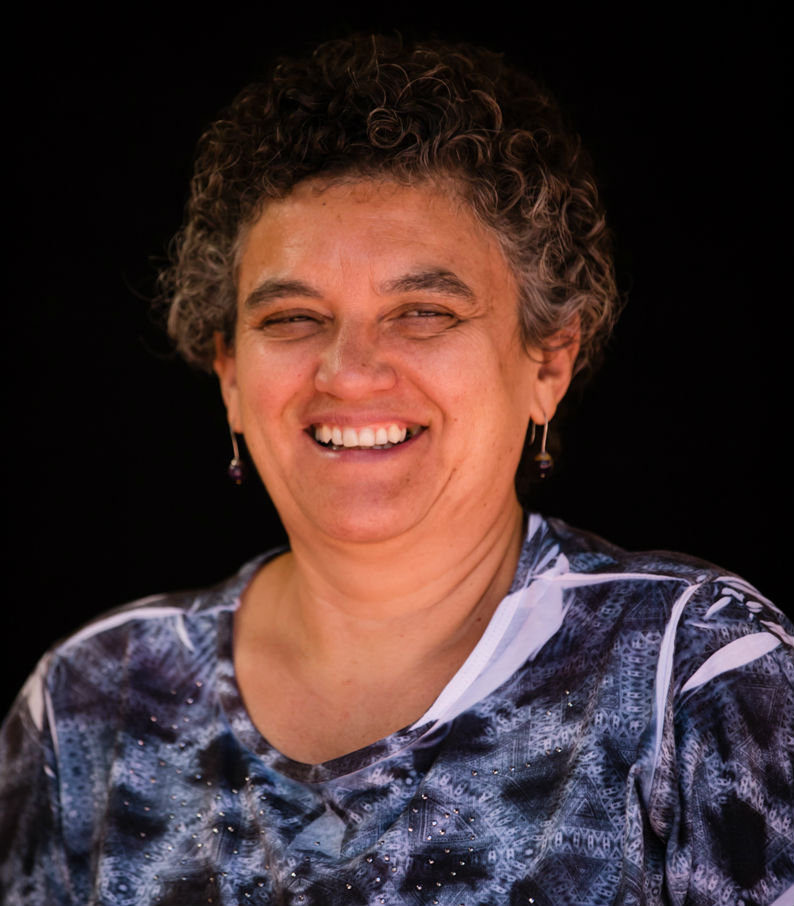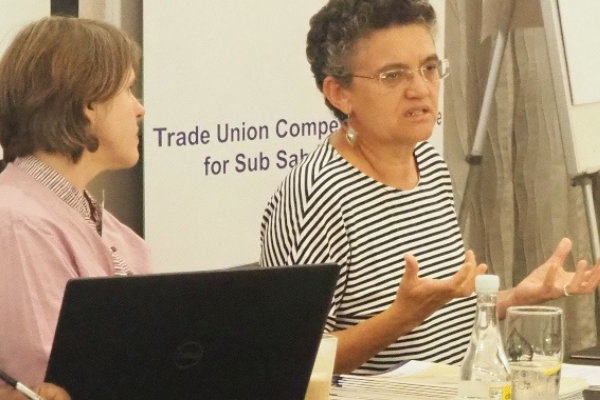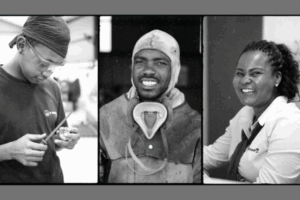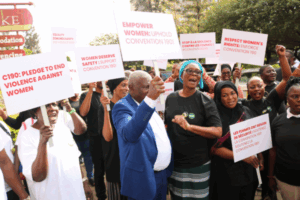The continuous renewal of worker education and research is critical for supporting a trade union movement daily dealing with a changing definition of a worker and workplace, and with an ever-shrinking space to organise. What we need is a collective vision, a vision that is informed by past struggles but alive to our present-day realities.
Building membership-driven unions: the role of education and research
The mission of the Labour Research Service is to support trade union development through conducting research, providing information and facilitating participatory education. There is an interplay between our education and research work – our education work generates research questions and our research work informs our education activities.
We locate our work broadly within the Freire popular education approach, working with action/reflection cycles and the dialectic between theory and practice. Collectively with workers, we dynamically work in these cycles to analyze the fullness of their diverse experience in sectors, age, gender and levels of precarity. Our work focusses on the everyday experiences of workers, the experience of alienation in highly exploitative workplaces and the potentially liberating experience of taking action as individuals in collectives like trade unions. We move between educator and learner roles. Some of our work draws on more organised bodies of theoretical and historical knowledge, for example, our work supporting economic literacy for collective bargaining.
How we're experiencing our research and education roles
We’re responding to what I’d call a “deficit” model. Skills shortages and the need for qualifications is a challenge in South Africa. In the trade union movement, the “deficit model” is manifested in the pressure and race to obtain qualifications that’ll assist the individual union leader to make a meaningful contribution to the growth of the union. The 4th Industrial Revolution (4IR) discourse has intensified the “deficit model”, and the bosses are using the rhetoric of “skills shortage” and “4IR” as powerful means of entrenching a sense of disempowerment, of being “out of the race”. In this context, it becomes increasingly difficult to put the everyday experience of workers (as conveyed by workers themselves) at the centre of our education and research. Nevertheless, we are using methodologies that give a voice to the diversity of experiences of workers across all sectors, recognising that organisational forms are alive, fluid and shaped by the actions of workers. There are no quick solutions, time is our biggest investment.
Precarious work
Centring the experiences of women in trade union education is challenging. We see the contradiction of the union model focused on the ‘industrialized male worker’. The thinking from a recent gathering of Friedrich Ebert Stiftung – Trade Union Competence Centre‘s core partner organisations resonates with us, that: “Broad parts of the working population, and in particular women in informal and precarious working conditions, are no longer adequately represented by trade union organizations.”
We’ve found the potential for disruptive and transformative worker education out of this contradiction. As a research and educational organisation that’s committed to a labour movement that’s part of a vibrant civil society that promotes egalitarianism, we’re focused on valuing workers in precarious forms of work as sources of knowledge and exploring what it takes to create the much-needed organic intellectuals that’ll sustain the worker movement in a context where the words ‘women’ and ‘intellectual’ are seldom used in the same sentence. Additionally, we’re pondering what it means to create research with and not research about workers.
The future of education and research for trade union development
There are many new challenges we face and it is a time for being bold, but also sensitive – sensitive to what it means to contribute to creating the resilience and power to individually and collectively undo the impact of precarious work on workers.
In the midst of the rapid changes in workplaces, our education work must find a place of ‘stillness’ that provide inclusive spaces where voices can emerge or be heard. We are constantly drawing on feminist work on trauma and healing to create the kind of spaces where workers feel supported to be part of creating a collective research and education agenda.
Modelling the mediating role of knowledge in worker education
Through mass actions and cultural representations, our trade unions have gained experience creating the ‘skills within’ (e.g. confidence and willingness to challenge) that form part of the mediating of knowledge. The big question is whether this is working for the workers we are now connecting with. Consider a worker in precarious employment who might be experiencing isolation and intimidation. This worker is likely unfamiliar with the organisational forms that we are offering and it is our challenge to take the time and create the physical or virtual spaces that help us build trust, listen too and give value to the experience and aspirations of each individual worker. “You are very important” is our education message.
Embracing old and new education methodologies and strategies
The changing labour context puts the onus on us to strengthen our focus on collective learning using traditional forms, for example, workshops and meetings, and emergent forms such as online courses. One key action for success is using methodologies that capture the voices of workers who feel that they’re on the margins of the world of work and are therefore voiceless.
Our biggest education and research challenge continues to be how we can value and place at the centre what workers themselves articulate as their lived experience and vision for the future with what we as educators have learnt and theorized over time.
The Trade union movement needs upright people with strong critical faculties. Only then will the practice have liberating content. Trade union training must generate an attitude of ethical commitment, given the demanding task of achieving the common good. This also implies promoting political awareness among workers, so that they are in a position to judge historical contexts and shackling structures.
Benítez; Calderón 2007: 79, Strengthening the trade unions: The key role of labour Education
Nina Benjamin is the leader of the Gender Equality Programme of Labour Research Service.







